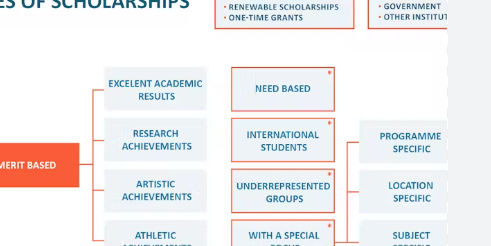Breaking Down the Types of Scholarships: Finding What Fits You Best

Scholarships are a valuable resource for students seeking financial assistance to pursue their education. They come in various forms, each catering to different criteria, qualifications, and interests. Here’s a breakdown of the types of scholarships available to help you find what fits you best: Merit-Based Scholarships: These scholarships are awarded based on academic achievements, such as GPA, standardized test scores (SAT, ACT), or exceptional talents in specific fields like athletics, arts, or leadership. Merit-based scholarships typically require a high level of academic performance or notable accomplishments. Need-Based Scholarships: These scholarships are awarded based on
financial need. They take into account factors such as family income, assets, and the cost of attendance. Financial need is usually determined through the Free Application for Federal Student Aid (FAFSA) or other financial aid forms. Demographic-Based Scholarships: These scholarships target specific demographic groups, such as ethnicity, gender, religion, nationality, or disability status. They aim to promote diversity and inclusion in higher education and may require applicants to belong to a particular demographic group. Career-Specific Scholarships: These scholarships are designed for students pursuing education in specific fields or industries. They may be offered by
professional organizations, companies, or institutions related to the chosen career path. Examples include scholarships for STEM (Science, Technology, Engineering, and Mathematics) fields, healthcare, education, or business. Community-Based Scholarships: These scholarships are provided by local community organizations, foundations, businesses, or civic groups. They are often tailored to support students from a particular geographic area or community and may require applicants to demonstrate involvement or commitment to community service. College-Specific Scholarships: Many colleges and universities offer their own scholarships to attract and support talented students. These scholarships may be based on academic merit, financial need, or specific criteria set by the
institution. Students should check with individual colleges for available opportunities and application requirements. Essay-Based Scholarships: These scholarships require applicants to submit essays on specific topics or prompts. Essay-based scholarships assess applicants’ writing skills, creativity, and ability to articulate ideas effectively. They may cover a wide range of subjects, from personal experiences to academic interests or social issues. Creative Arts Scholarships: For students with talents in areas such as music, dance, theater, visual arts, or creative writing, there are scholarships specifically geared toward supporting their artistic endeavors. These scholarships may require
auditions, portfolios, or submissions of creative work as part of the application process. Athletic Scholarships: Athletic scholarships are awarded to student-athletes who demonstrate exceptional skill and potential in sports. These scholarships are typically offered by colleges and universities and can cover part or all of the student’s tuition, room, board, and other expenses. Eligibility often depends on athletic ability, academic performance, and NCAA regulations. Military Scholarships: Military scholarships are available to students who are current or former members of the armed forces, as well as their dependents. These scholarships may be offered by military branches, veterans’ organizations, or government agencies and can help cover the costs of education for service members and
their families. When searching for scholarships, it’s essential to research and apply for those that align with your qualifications, interests, and goals. Keep in mind deadlines, eligibility requirements, and application processes for each scholarship opportunity. Additionally, consider exploring multiple sources of funding, including federal aid, grants, work-study programs, and private scholarships, to maximize your financial support for education.Here are a few more types of scholarships to consider: International Scholarships: These scholarships are available to students from countries outside of the host country. They may be offered by governments, international organizations,
universities, or private foundations to support international students’ educational pursuits. International scholarships can help cover tuition, living expenses, and other costs associated with studying abroad. Minority Scholarships: Minority scholarships aim to support students from underrepresented racial or ethnic groups. They seek to address disparities in access to higher education and promote diversity on college campuses. Minority scholarships may be offered by government agencies, corporations, nonprofit organizations, or advocacy groups. First-Generation Scholarships: First-generation scholarships are designed for students who are the first in their families to attend college. These scholarships recognize the unique challenges and barriers faced by first-generation
college students and provide financial assistance to support their educational goals. They may be offered by colleges, universities, foundations, or nonprofit organizations. Study Abroad Scholarships: Study abroad scholarships help students finance international study experiences, including semester or year-long programs, language immersion courses, or cultural exchanges. These scholarships support students’ global learning experiences and cultural immersion by covering expenses such as tuition, travel, housing, and other program-related costs. Graduate School Scholarships: Graduate school scholarships provide financial support for students pursuing advanced degrees, such as master’s or doctoral programs. These scholarships may be awarded based on academic achievement, research potential, professional experience, or specific criteria related to the graduate field of study. Graduate school
scholarships are available from universities, private foundations, government agencies, and professional associations. Entrepreneurial Scholarships: Entrepreneurial scholarships support students who demonstrate entrepreneurial spirit, innovation, and business acumen. These scholarships may be offered by entrepreneurial organizations, startup incubators, venture capital firms, or business schools to encourage and foster the next generation of business leaders and innovators. STEM Scholarships for Women and Girls: STEM scholarships specifically target women and girls pursuing education and careers in science, technology, engineering, and mathematics fields. These scholarships aim to address gender disparities in STEM fields and encourage greater participation and representation of women in STEM-related disciplines. They may be offered by universities,
corporations, nonprofit organizations, or professional societies. Transfer Student Scholarships: Transfer student scholarships are available to students who are transferring from a community college or another institution to a four-year college or university. These scholarships recognize academic achievement, leadership, and community involvement among transfer students and help support their transition to a new academic environment. High School Senior Scholarships: High school senior scholarships are awarded to graduating high school seniors who are planning to enroll in college or university. These scholarships may be based on academic performance,
extracurricular involvement, community service, or other criteria. High school senior scholarships provide financial assistance to students as they begin their post-secondary education journey. Legacy Scholarships: Legacy scholarships are offered to students who have family members, such as parents or grandparents, who attended the same college or university. These scholarships honor family legacies and traditions and may provide financial support to descendants of alumni as they pursue their education at the institution. Remember to thoroughly research each scholarship opportunity, review eligibility requirements, and submit applications by the specified deadlines to increase your chances of receiving financial assistance for your education. Additionally, consider leveraging
resources such as scholarship search engines, college financial aid offices, and guidance counselors to identify and apply for scholarships that best fit your background, interests, and aspirations.





